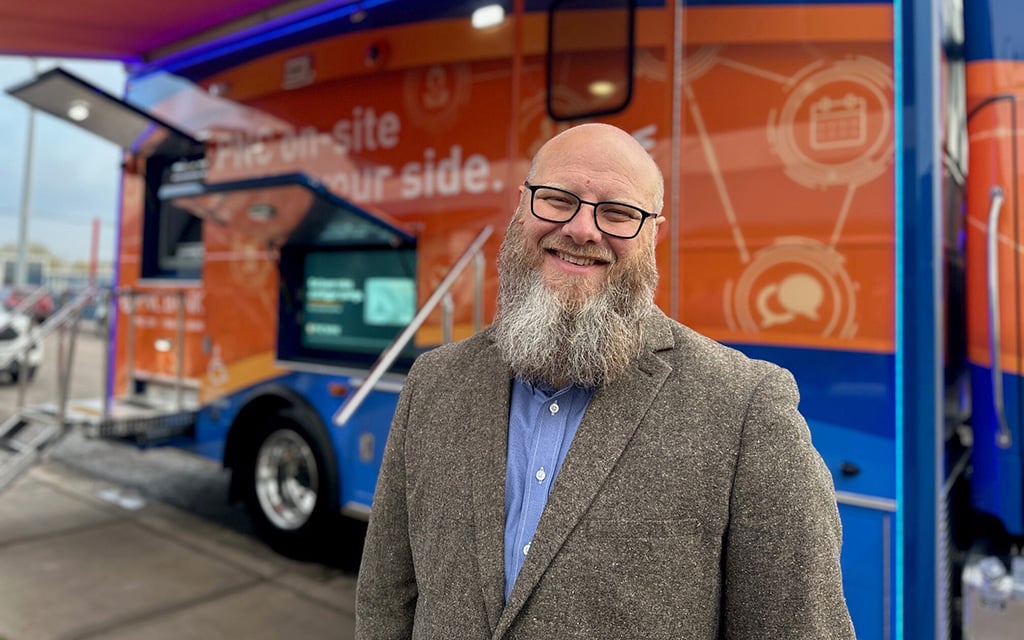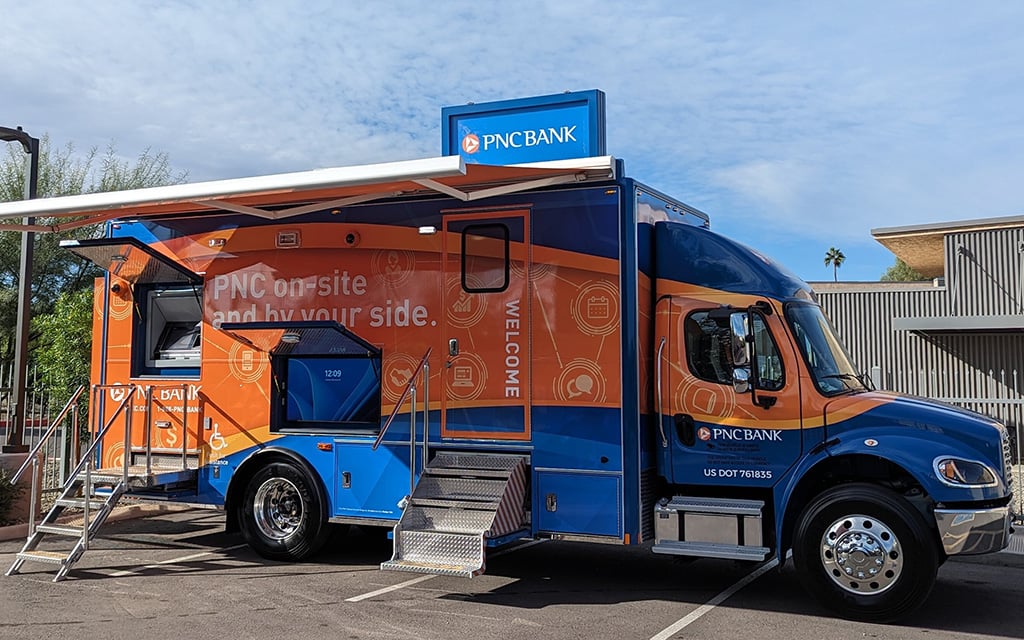
David Crummey, Arizona’s PNC Bank Community Development Officer of Community Development Banking, stands in front of PNC’s mobile branch on Jan. 24, 2024 (Photo courtesy of PNC Bank)
PHOENIX – For some, going to the bank is a regular errand, but for others, it’s a difficult and sometimes impossible task. That’s why some programs bring the bank to the customer instead of making the customer come to the bank.
With portions of Arizona’s population having limited or nonexistent access to banking services, financial institutions are working with nonprofits to help. Bank branches on wheels is one tool they’re trying out to provide financial education and get more people signed up for bank accounts.
According to data compiled by economic justice nonprofit Prosperity Now, 17% of Phoenix households were underbanked in 2021 compared to 14% of households nationwide. Underbanked households have a bank account, but they rely primarily on cash and alternative financial services like payday loans to manage their money.
Prosperity Now reported that nationally and in Phoenix, 5% of households were unbanked, meaning they have no bank account or access to any banking service.
Geoffrey Smith, a clinical professor in the finance department of Arizona State University’s W.P. Carey School of Business, said the problem stems from inadequate financial literacy and anxiety around money.
“There’s not a lot of good personal finance education at, say, the high school level or the grammar school level. There’s sort of an assumption that people will just absorb this knowledge through just life,” he said. “But I think for some people, there might be some intimidation or not understanding how it works.”
Now, large banks are investing money and resources in financial literacy and making their services more accessible.
In January 2022, PNC Bank launched its Community Benefits Plan, an $88 billion investment in loans and financial resources for those with low to moderate income. Banks on wheels were part of the plan, and Phoenix is the seventh market where PNC Bank has added them. Other host cities include Chicago, Baltimore and Houston.
PNC Bank partners with local organizations to bring the bank on wheels to their locations on a regular basis. In Phoenix, the Foundation for Senior Living’s (FSL) Village on Roeser began hosting the banks on wheels in December, and the Society of St. Vincent de Paul began hosting in January.

The PNC mobile bank branch sits ready for patrons to enter on Jan. 24, 2024, in Phoenix. (Photo courtesy of PNC Bank)
Though patrons can create an account at the mobile branch, financial education is the main goal, said David Crummey, a PNC Bank vice president and Arizona’s community development officer of community development banking.
“The primary goal of the mobile branch is to have financial conversations with residents,” he said. “It’s about budgeting. It’s about what is working for you and what isn’t working for you.”
FSL’s Director of Development Amy O’Sullivan said residents are pleased with the mobile branch’s friendly staff and the fact that they can withdraw as little as a dollar.
“For some people, pulling out $20 can be a lot of money, so having the opportunity to pull out $1 or $5 and not feel as if they’re draining their bank account is a really big deal,” she said.
Mobile banks aren’t the only strategy though, and brick-and-mortar banks are still a major part of the effort to address banking access issues.
Bank On is a nationwide initiative by the Cities for Financial Empowerment Fund to help people establish banking relationships. Arizona’s coalition, Bank on Arizona, is partnering with Dress for Success Phoenix, a nonprofit dedicated to helping women achieve financial independence.
Jessica Howell, Dress for Success Phoenix’s director of community engagement and Bank On Arizona fellow, said the coalition wants to increase communication and advocacy between local organizations and financial institutions in the same area.
“We know our clients’ needs, and sometimes our financial institutions are removed from that knowledge,” she said. “So, the improvement of (financial services) is providing that knowledge that, ‘Hey, this is the need that our clients are stating,’ and it’s really honestly building that bridge of trust.”
Though Howell said the coalition plans to use PNC’s mobile branch services, she said that brick-and-mortar banks can be part of the solution, noting there are “other financial institutions on our coalition that although (they) might not have a wheels capability, they send individuals that are able to go out into the community and sign up accounts on site.”
Smith mentioned another remedy for those who have trouble accessing banking services.
“One of the big industries nowadays is fintech, which is using technology to give access to people in lesser-served communities,” he said. “You can bank on your phone or remotely, so you don’t need a brick-and-mortar branch. And it reduces the costs, too, of opening accounts, transferring money and so on.”
Fintech, short for financial technology, encompasses technologies that automate financial services for businesses and individuals. It includes payment apps PayPal, mobile investment services like Robinhood and digital budgets like Mint.
Smith said that the main barrier to growth for fintech is that startups have to comply with hefty regulations. But he said despite the constraints, fintech is still an exploding industry.
